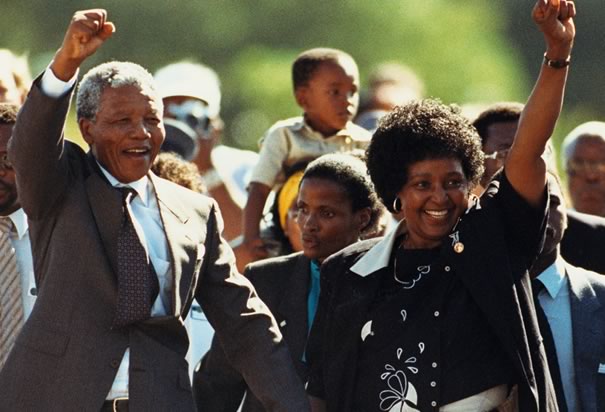 |
| Mandela, leader of the African National Congress (ANC) in the 1950s before his imprisonment. (Wikispaces). |
The ANCYL wanted to transform the ANC into a mass movement, with the hopes of being backed up by the millions of people who had no voice under the apartheid regime. In 1948, the apartheid regime grew in strength as the National Party, the party of the apartheid, came into power. In 1949, the ANC officially adopted the Youth League's methods of boycott, strike, civil disobedience, and non-cooperation, with policy goals of full citizenship, redistribution of land, trade union rights, and free and compulsory education for all children. In 1952, the ANC launched the campaign for Defiance of Unjust Laws. Nelson Mandela traveled around South Africa as the youth leader of this campaign and this is when the apartheid regime first took note of him. They restricted him from working in this campaign and forced him to stay in Johannesburg. The government banned him from meetings for six months. Around this time, he established a law firm with a Fort Hare student, Oliver Tambo, that provided free and inexpensive counsel to unrepresented blacks. After some time, Mandela realized they could not rely on nonviolent acts of defiance alone to make the apartheids listen. The ANC soon incorporated armed resistance into their methods.
 |
| Mandela wearing his prison number. (Wikispaces). |
In 1956, Mandela and 150 others were arrested and charged with treason for their political advocacy. At the same time, the ANC was being challenged by Africanists, new black activists who believed that the ANC's method were too ineffective. Africanists broke off from the ANC and formed the Pan-Africanist Congress. This caused the ANC to lose a large portion of its support by 1959.
In 1961, tactics changed and Mandela began to believe that armed struggle was the only way to achieve change. He then co-founded Umkhonto we Sizwe, (MK), an armed offshoot of the ANC dedicated to sabotage and guerilla war tactics to end apartheid. That same year, he organized a three-day national workers' strike and was sentenced five years in jail for forming the strike. In 1963, Mandela was tried again, along with 10 other ANC leaders, and they were all sentenced to life in prison for their political offenses.
 |
| Mandela's release from prison makes the news world-wide. (Wikispaces). |
 |
| Nelson Mandela and his wife Winnie after his release from prison (1990). (Photo courtesy of Corbis.) |

No comments:
Post a Comment